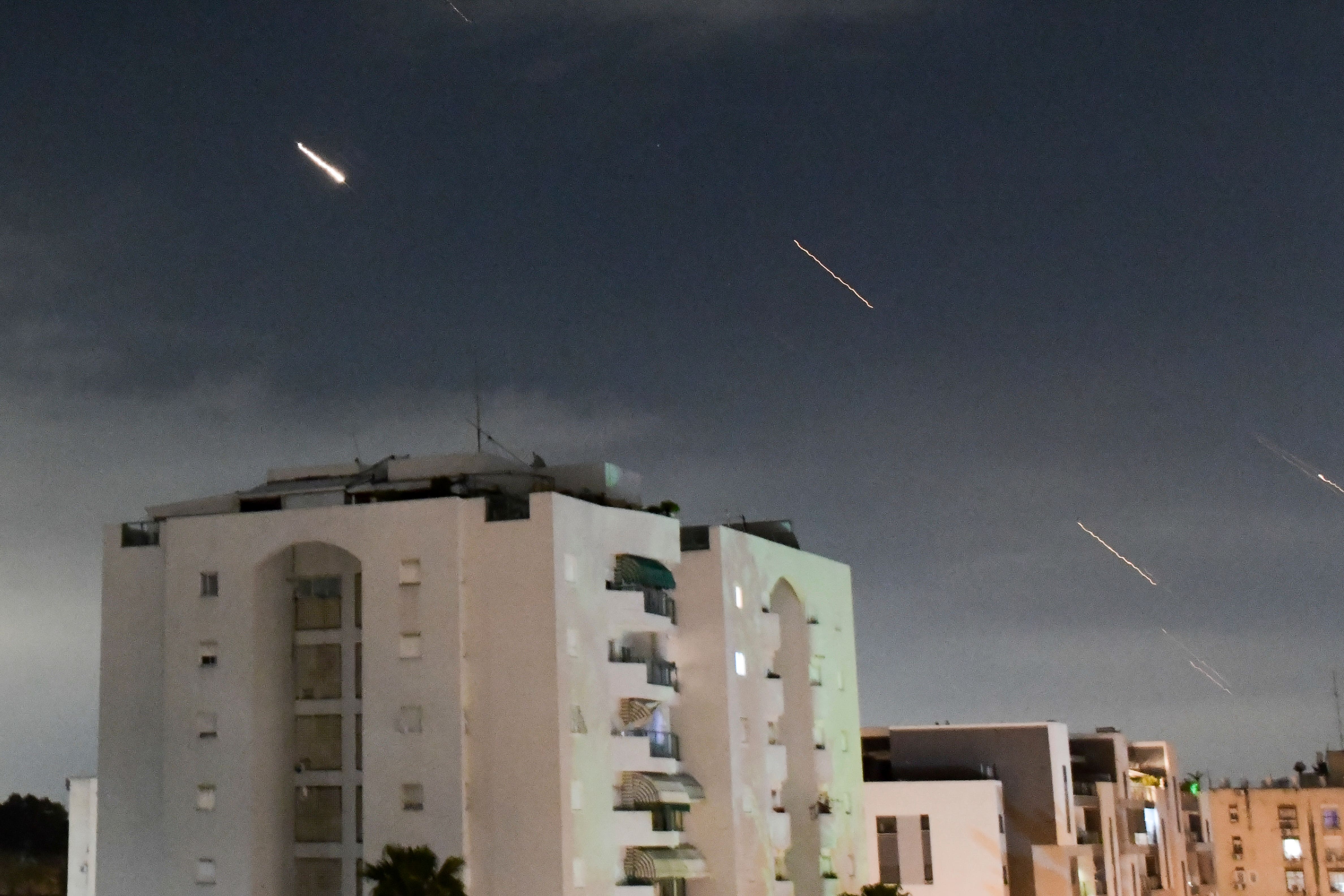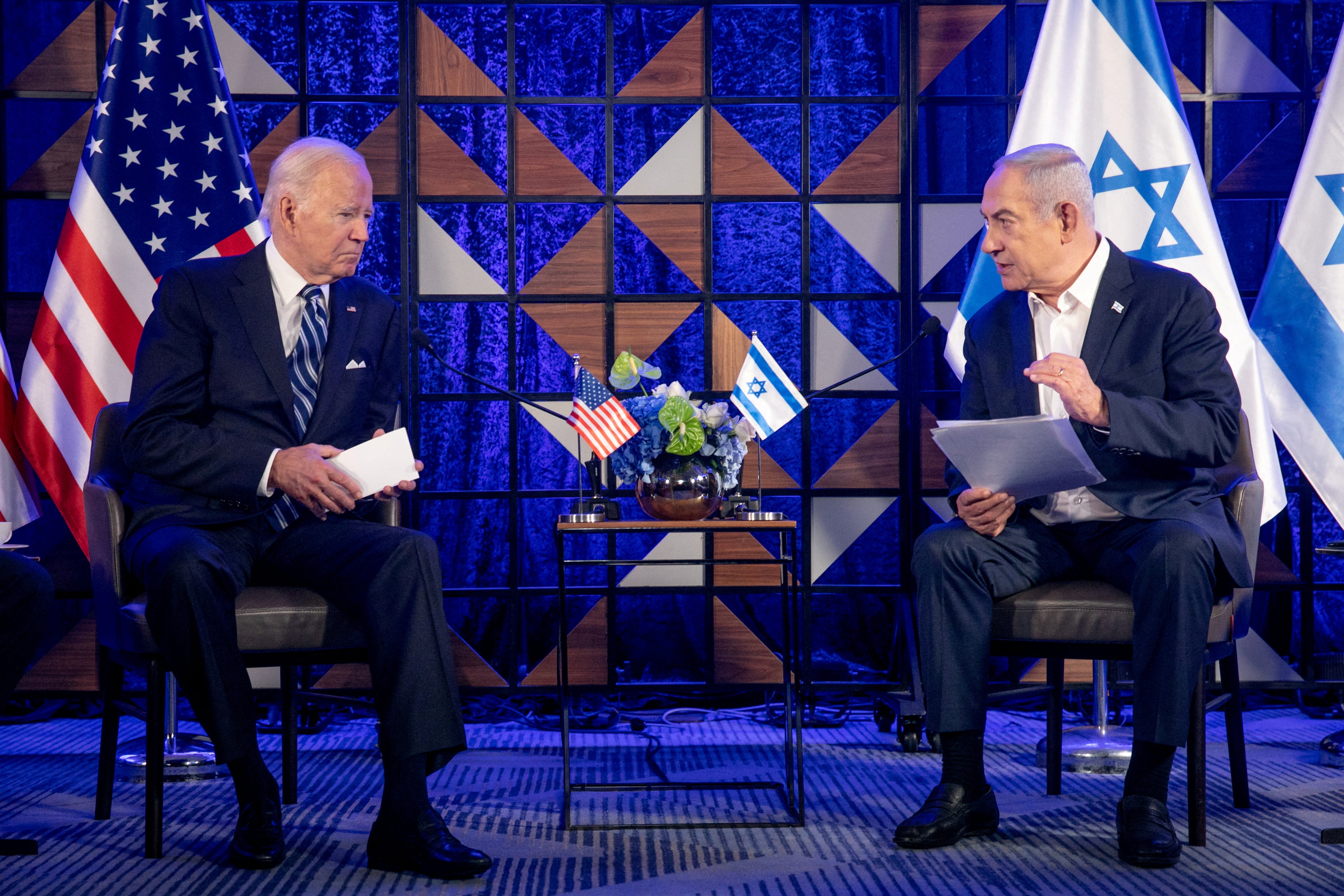US won’t seek war with Iran after strikes on Israel, White House says
President Biden condemned the “brazen attack” by Iran against Israel, but the White House also confirmed that it’s not trying to escalate the conflict further.

The United States condemned the overnight attacks against Israel by Iran and Tehran’s allied proxy groups across the Middle East overnight Saturday into Sunday morning, but stated firmly that the Biden administration remains committed to avoiding a regional war.
Nearly 300 drones and missiles were reported over the skies of Israel Saturday evening as Iran and its allies launched what has been reported to be the largest single drone attack in history. Israeli air defences intercepted the vast majority of the incoming fire, according to initial reports, and no deaths have been reported.

President Joe Biden released a statement shortly before 11pm local time, calling the drone strikes that were largely intercepted by Israeli air defences a “brazen attack” against a US ally. He added that he had reaffirmed his support for Israel’s defence in a call with Prime Minister Benjamin Netanyahu.
“At my direction, to support the defense of Israel, the U.S. military moved aircraft and ballistic missile defense destroyers to the region over the course of the past week. Thanks to these deployments and the extraordinary skill of our servicemembers, we helped Israel take down nearly all of the incoming drones and missiles,” said the president.
He added that he told Mr Netanyahu “that Israel demonstrated a remarkable capacity to defend against and defeat even unprecedented attacks – sending a clear message to its foes that they cannot effectively threaten the security of Israel”.
As Washington woke up to the news, however, the White House clarified the president’s words to underscore that the US would not be drawn into direct conflict with Iran. John Kirby, spokesman for the national security council, told NBC’s Meet The Press that the administration was “not looking for escalation” after the attack and was asked by moderator Kristin Welker about reporting indicating that Mr Biden had told Mr Netanyahu in their conversation Saturday night that his administration would not support an Israeli counterattack.
“You got a win. Take the win,” Mr Biden reportedly told the Israeli prime minister.
Mr Kirby responded that the US president had stated his support for Israel’s “self-defence”, while not elaborating further: “I won't go into more detail. Again, I just go back to what the president has said time and time again: We don't seek an escalation. We don't seek a wider war in the region.”

Later on Sunday, the leaders of the G-7 (including the US) released a joint statement on the attack.
“We, the Leaders of the G7, unequivocally condemn in the strongest terms Iran’s direct and unprecedented attack against Israel. Iran fired hundreds of drones and missiles towards Israel. Israel, with the help of its partners, defeated the attack,” it read. “We express our full solidarity and support to Israel and its people and reaffirm our commitment towards its security.”
The leaders’ statement continued: “With its actions, Iran has further stepped toward the destabilization of the region and risks provoking an uncontrollable regional escalation. This must be avoided. We will continue to work to stabilize the situation and avoid further escalation. In this spirit, we demand that Iran and its proxies cease their attacks, and we stand ready to take further measures now and in response to further destabilizing initiatives.”
“We will also strengthen our cooperation to end the crisis in Gaza, including by continuing to work towards an immediate and sustainable ceasefire and the release of hostages by Hamas, and deliver increased humanitarian assistance to Palestinians in need,” the statement concluded.
The Iranian strike comes at a time of deteriorating relations between the Biden administration and Mr Netanyahu’s government; the US president has been reported to be increasingly frustrated with the scope and scale of Israel’s assault on Gaza, while unwilling to leverage US military aid in a meaningful manner in an effort to change Mr Netanyahu’s policies.
At the same time, the Biden administration is showing more willingness to criticise Israel’s actions, including the killings of seven World Central Kitchen aid workers.
In his interview, Mr Kirby seemingly confirmed that some level of backchannel communications were occurring between the US and Iran amid the rise in hostilities across the Middle East. Such communications, if they are transpiring, are a positive sign for those in the White House seeking to avoid that broader potential conflict.
He added that in the administration’s dealings with Iran, the US would continue to make clear “what we would do, and how we would continue to defend Israel, and also how seriously we would take any potential threat to our personnel and our facilities in the region.”
Talk among conservatives, meanwhile, veered sharply towards calling for retaliatory strikes against Iran conducted by US forces. Washington’s hawkish right has long argued that strikes by Iranian forces and their proxies, even those that do not not inflict meaningful damage, should be met with overwhelming force.
Former Trump national security adviser John Bolton warned on CNN that “unless Iran sees a powerful response, that risk [of another attack] will continue”.
Mr Bolton, long known for his advocacy of US force against Iran, went on to call President Joe Biden an “embarrassment” for his de-escalatory rhetoric in the CNN interview; he also suggested Israel look at Saturday night’s attack as an “opportunity” to strike Iran’s nuclear programme.
Senator Marsha Blackburn, another longtime Iran hawk, added on Twitter: “we must move quickly and launch aggressive retaliatory strikes on Iran.”
Join our commenting forum
Join thought-provoking conversations, follow other Independent readers and see their replies
Comments
Bookmark popover
Removed from bookmarks